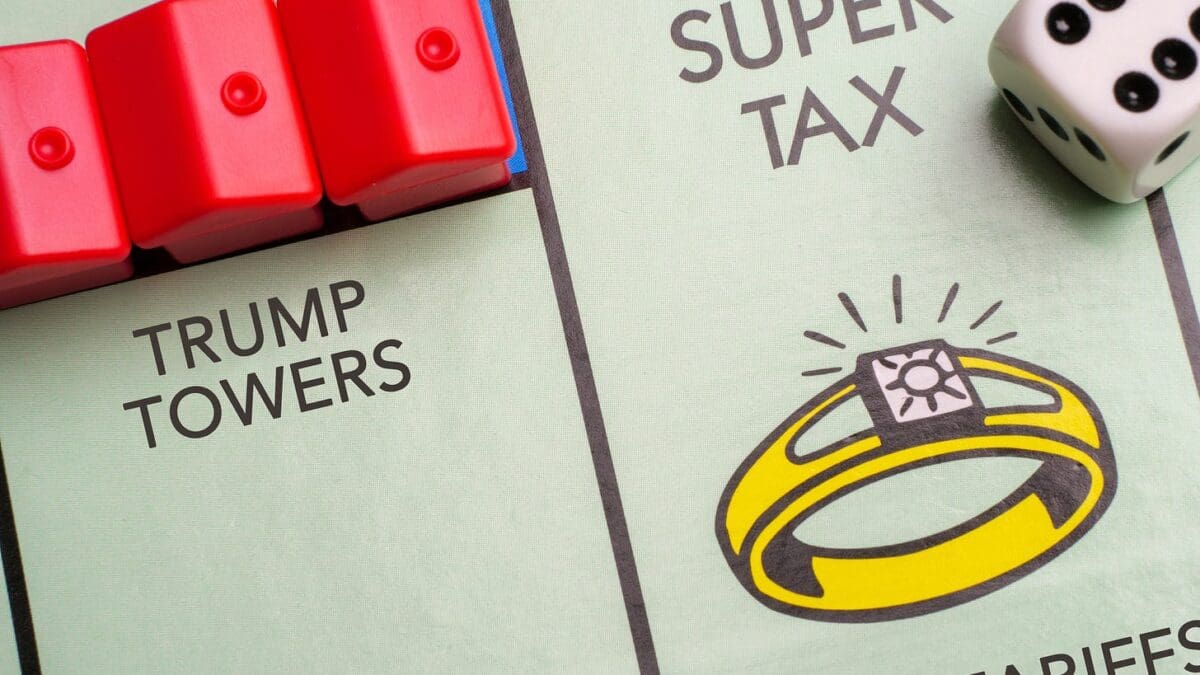
Fact-check: Who’s right in the Musk-Navarro feud over Tesla?
April 8, 2025
Immigration judge to rule Friday on detained activist Mahmoud Khalil
April 8, 2025DONALD TRUMP’S TARIFFS are so punishing that even the houses in Monopoly are going to get more expensive.
And I do mean that literally.
While the tariffs will have profound impacts on big-ticket items like cars and everyday purchases like groceries, they also will slam the retail sector. And that includes items like board games, which are designed and sold here in America—but are, in almost every case, manufactured overseas.
Games typically have a handful of components, mostly made from paper (cards, boards) and plastic (pieces, tokens, dice). When and if the tariffs kick in on Wednesday, those components will get a lot more expensive, putting new pressure on the companies that manufacture them to raise their prices or suffer losses.
Industry leaders told me they anticipated the tariffs and were already adapting. The larger companies—like Hasbro, which sells Monopoly and many other name-brand games—had already moved much of their production out of China and into nearby countries like Vietnam, which they thought Trump was less likely to target.
They didn’t plan for Trump going after those nations as well, and they certainly didn’t count on the president calling for tariff spikes well beyond the 10 or 20 percent most analysts thought he had in mind.
That explains why stock for Hasbro and rival toy company Mattel, which had actually held up pretty well after Trump’s first round of tariffs on China, fell sharply with the rest of the market this past week.
“This is untenable for our industry,” Greg Ahearn, president of the Toy Association trade group, told me.
“Untenable” can have different meanings, of course.
For a large company like Hasbro, the Trump tariffs will probably translate to slowdowns, layoffs, and losses, as they muddle through the hard times. The future seems bleaker for smaller companies—i.e., the mom-and-pop operations of the game world—as I learned this week after a conversation with a man named Price Johnson.
JOHNSON IS THE CHIEF OPERATING OFFICER of Cephalofair, a California- and Indiana-based producer of high-end, role-playing and strategy games. In the decade that the company has been around it has done about $30 million in business. (Its best seller so far is Frosthaven, an adventure role-playing game set in an icy fantasy realm.)
Cephalofair relies on Chinese companies for production of its boards and pieces. Like larger game companies, it had anticipated and started planning for tariffs under Trump—and thought things would be okay early on.
Then came last week’s announcement, with the 54 percent tariff on Chinese goods, followed by Trump’s suggestion—in response to Chinese retaliatory tariffs—that he’d nearly double the Chinese import tax to 104 percent.
“At that point, we’re paying more to land our product than we are to make it,” Johnson said. “And there’s just no reasonable way—at 54 percent or 104 percent—for us to build that into our pricing. Our products no longer become retail-viable.”
The Cephalofair business model is to announce that they are designing a game, solicit input from potential customers, and then raise enough money from those customers to cover their costs—in other words, it’s a form of crowdfunding. Once they’ve fulfilled the initial orders to those early customers, they sell through stores and other retail outlets.
It’s a fairly common business model for makers of mid-price-point, non-luxury products with production runs in the thousands, especially relating to niche hobbies or interests. That description certainly fits the boutique gaming business, where an individual game can retail for more than $100.
But this model also makes these companies vulnerable to tariff shocks, because their planning cycles can span several years and they have already committed to selling large quantities of games—the ones for the initial customers—at a price that could end up well below their costs.
“We calculate our cost of goods, we calculate our ocean freight, we calculate our warehouse fulfillment costs, and postage,” Johnson said. “We even account for things like postage inflation, year over year, and possible world events—like an ocean freight spike—that could unexpectedly raise costs. But at the time that we ran our project, there were zero percent tariffs, and there wasn’t any indication of any number like this coming along a year out or two years out.”
Cephalofair has eight full-time employees who work remotely, plus it works with hundreds of freelancers and contractors. It’s a small, tightly knit firm of game enthusiasts, including Johnson, a dad who first started working for the company as a part-time moonlighter, in between stints of feeding a newborn. He and his wife now have two young kids and live in the Sacramento suburbs, where they moved from the city for the school district and a chance to have a house with a yard.
During our interview, Johnson mentioned that one reason the company didn’t want to hike prices was that it would be tough on the customers, whom he and the gamemakers consider a community—in part, because they consult with the initial buyers during the customization of the games.
“We’ve always been a passion-before-profits company,” Johnson said. “We have always charged as little as possible so we can get our games into as many hands as possible.”
Johnson told me he has been trying to get the attention of his representative in the U.S. House, two-term Republican Kevin Kiley, who recently held two virtual town halls following complaints from constituents who said he was ducking their questions. Johnson said the questions were pre-screened and seemed to avoid difficult topics, including the impact of tariffs on California small businesses like his.
“I think he is actively avoiding his constituents and the community,” Johnson said.
I put in a question to Kiley’s office about this and haven’t heard back. For now, Johnson said, he’s hoping the trade associations representing game and toy manufacturers can prevail upon Congress to act. Otherwise, he said, his industry is in big trouble.
“We’re going to see higher costs and fewer products,” he said. “We’re going to see retail stores close . . . brick-and-mortar, mom-and-pop shops are going to be closing. There will be publishing houses that have to close their doors.”
HOW THIS NEW TRADE WAR will play out depends on which Trump official you ask and when. At times, they’ve suggested the president wants to see the tariffs take effect and stay in place indefinitely, in part to raise revenue. At other times—including Tuesday—they have said he mainly intends the tariffs to serve as a threat, to get better trade agreements with other countries.
Either way, both Trump and his advisers have suggested at times a primary goal of their strategy is to bring manufacturing jobs back to the United States—an idea that has undeniable appeal, especially in parts of the country like the Midwest where factory employment remains far below what it once was.
But “reshoring” the game industry can’t happen right away, Ahearn said, because the production of game and toy pieces—like so many other kinds of manufacturing—has become highly specialized and dependent on complex supply chains that countries like China have spent decades perfecting.
“It will take probably five to seven years at the least to be able to build up this capacity here,” Ahearn said.
And as with every other industry, it’s hard to imagine companies making those kinds of investments given the administration’s inconsistent rhetoric on whether Trump sees the tariffs as a permanent feature of economic policy or merely a negotiating tool.
That doesn’t mean there’s no case for rebuilding America’s industrial base, or at least reconstituting it in some form. On the contrary—and as economists like Paul Krugman have argued—you can make a strong case for having government bolster sectors that can support higher-wage jobs or where the United States has a clear national interest in maintaining domestic productive capacity.
So, for example, you might not want to depend on other countries for microprocessors, which power every machine imaginable, or for pharmaceuticals and medical supplies, given (as we saw during COVID-19) the potential of pandemics to disrupt global supply chains. You might want to build solar panels here, for the sake of energy independence, and electric vehicles too, since an EV could be a tank just as easily as it could be a car.
This should all sound familiar if you were paying attention to politics for the last few years, because it’s precisely the approach Joe Biden and the Democrats took—through the CHIPS Act, which put hundreds of billions of dollars of subsidies into building semiconductor capacity in America, and the Inflation Reduction Act, which put even more money into the manufacturing of clean energy and electric vehicles.
The impact has been visible all across the country, with new plants everywhere from South Carolina to Michigan, and Kentucky to Arizona. Manufacturing construction soared to record levels during Biden’s presidency. And while some of that increase was a rebound from the pandemic a big chunk was from those two laws.
Tariffs were also part of the Biden strategy, though in a much more limited sense: The administration deployed them selectively and narrowly, in cases where they believed a trading partner was engaging in unfair trade practices. Sometimes that meant keeping in place modest tariffs Trump had implemented during his first term, and sometimes that meant adding new ones.
Either way, it’s far different from Trump’s current gambit: a strategy that combines much higher, much more sweeping tariffs with a rollback of the manufacturing supports Democrats put in place. Trump has pledged to get rid of the Inflation Reduction Act, especially what he (misleadingly) calls its “electric vehicle mandate,” and he’s been critical of the CHIPS Act as well.
There are already signs that Trump’s economic policies are stamping out the Biden factory boom: During the first quarter of 2025, clean-energy companies on net canceled more construction projects than they had canceled in all of 2023 and 2024, according to data from Atlas Public Policy. “It’s hard at the moment to be a manufacturer in the U.S. given uncertainties on tariffs, tax credits and regulations,” Tom Taylor, one of the group’s senior analysts, told the Washington Post.
Retrenchment among manufacturers could be the prelude to slower growth or even a recession, which forecasters now think far more likely thanks to Trump. And among the industries that could feel the impact first is the game industry, because its products are by definition discretionary.
“Games are entertainment, like going to movies or sporting events or the theater,” John Stacey, president of the Game Manufacturers Association, told me. “‘I’ve got to make my mortgage, so I’m not going to buy a game this month.’ Demand is going to drop. A lot of businesses are going to go out of business. And I see retail stores closing too.”
Ahearn agrees with that assessment, and expects big losses for the industry if the tariffs remain in place, although he noted that sometimes lower-cost games continue to sell during economic downturns. The reason, he said, is that even in those periods most people will still need to buy a gift for kids now and then—for a birthday, say, or Christmas. Board games are a cheap way to do that.
History bears this out. Monopoly took off during the Great Depression, partly because it was a cheap way to pay for entertainment and partly because it was a way to pretend, for an hour or two, that you were the richest person around.
Sometimes it seems like the president and his advisers are playing a game with the tariffs too—one where they can rewrite the rules, get endless do-overs, and make the other players do whatever they want. But it’s not a game, and the play money is real.
Great Job Jonathan Cohn & the Team @ The Bulwark Source link for sharing this story.






